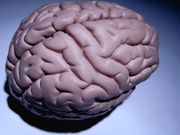No treatment-related deaths, graft-versus-host-disease reported in interim analysis
THURSDAY, Oct. 5, 2017 (HealthDay News) — Early results suggest that stem cell gene therapy is a safe and effective treatment for boys with early-stage cerebral adrenoleukodystrophy, according to a study published online Oct. 4 in the New England Journal of Medicine to coincide with the 2017 Child Neurology Society Annual Meeting, being held Oct. 4 to 7 in Kansas City.
Florian Eichler, M.D., from Massachusetts General Hospital in Boston, and colleagues enrolled 17 boys with cerebral adrenoleukodystrophy in a single-group, open-label, phase 2-3 safety and efficacy study involving infusion of autologous CD34+ cells transduced with the elivaldogene tavalentivec (Lenti-D) lentiviral vector. Inclusion criteria included having early-stage disease and gadolinium enhancement on magnetic resonance imaging (MRI).
The interim analysis (median follow-up of 29.4 months) showed that all patients had gene-marked cells after engraftment, with no evidence of preferential integration near known oncogenes or clonal outgrowth. All patients also had measurable ALD protein. There were no reports of treatment-related death or graft-versus-host disease. Fifteen of the 17 patients were alive and free of major functional disability, with minimal clinical symptoms. One patient with rapid neurologic deterioration died of disease progression, while another patient with MRI evidence of disease progression withdrew from the study to undergo allogeneic stem cell transplantation but later died of transplantation-related complications.
“Additional follow-up is needed to fully assess the duration of response and long-term safety,” conclude the authors.
Several authors disclosed potential conflicts of interest.
Copyright © 2017 HealthDay. All rights reserved.








